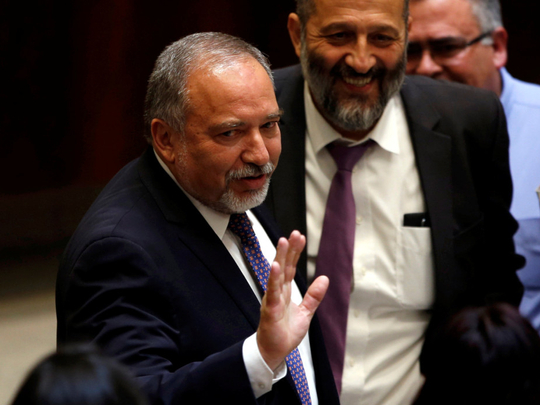
The international conference in Paris tomorrow, sponsored by French President Francois Hollande, to re-launch Palestinian-Israel peace efforts is saddled with serious problems precipitated by Israel’s right-wing Prime Minister Benjamin Netanyahu, who has unwittingly expanded his government to include extreme rightist elements.
A notorious inclusion was Avigdor Lieberman, a Russian Jew, who replaced Moshe Ya’alon as the Defence Minister — a step described by Amir Oren, a columnist in the liberal Israeli daily Haaretz, as a “black day for Israel, a day on which flags should fly at half-mast on all Israeli Defence Forces bases”.
Shockingly, Lieberman lives in the Israeli-occupied West Bank, a region that is only 22 per cent of the usurped Palestinian homeland. What’s crucial about the new Israeli defence minister is that his party has a few members in the Knesset who could bolster Netanyahu’s poor standing there, given that the prime minister has a majority of just one member in the House.
Netanyahu has also decried the French-sponsored conference, which will be attended by United States Secretary of State John Kerry who, in turn, had disappointingly abandoned the Palestinian-Israeli negotiations in April 2014. Much to Netanyahu’s fear is also the presence of nearly two dozen foreign ministers who are likely to stand against the Israeli position.
Arrogant Netanyahu insists that direct negotiations are the only path towards a lasting agreement with the Palestinians, in spite of the fact that the two sides have been locked in a bloody conflict since 1967 that ended in total Israeli occupation of the state of Palestine. Meanwhile, the 22-member Arab League supported the French initiative at a meeting last week in Cairo and pledged its support for “all Arab and international efforts” for peace between the Palestinians and Israelis.
Palestinian President Mahmoud Abbas underlined that he has “tried hard with the Israeli government to implement treaties and respect commitments, but they refused”. Speaking in Cairo, before the Arab League meeting last week, Abbas advocated the presence of Nato forces rather than Israeli troops in the Israeli-occupied West Bank as part of any peace deal that could lead to a two-state solution. He also rejected the idea of calling Israel a Jewish state since a quarter of the present population of Israel are Arabs, Muslims and Christians. Neither the Palestinians nor the Israelis have been invited to the Paris conference. However, this meeting is expected to be followed up by another later this year when the two sides will be among the participants.
Abbas, who welcomed the Paris conference, emphasised that “the purpose (of the meeting) must be to implement the visions of both states, based on the border agreement of 1967 and the capital of the Palestinian state being East Jerusalem, so that both countries can live side by side, in safety, stability and peace — if Israel wishes to seek peace”.
But how secure the new Israeli government remains is a serious issue in Israel. The Times of Israel, quoting an Israeli TV report, said that “senior members of Israel’s coalition believe the government may soon collapse, triggering elections within the next six months”. Israeli Channel 10 also quoted “unnamed political leaders” as saying that Netanyahu’s bid to expand his multi-party coalition by bringing in the hawkish Lieberman “is likely to turn out to be a move that will destroy the coalition”.
Lieberman’s appointment as Defence Minister has also triggered the resignation of Israeli cabinet minister, Avi Gabbay, of the Kulanu party, while another Israeli opposition leader, Isaac Herzog — who had been negotiating a partnership with Netanyahu until the prime minister later chose Lieberman — has refused to continue talks with Netanyahu. According to the Times of Israel, “Herzog has claimed that he was prepared to risk his political career to partner with Netanyahu because there was a rare opportunity for regional progress towards peace,” but Netanyahu “ran away” from that opportunity and opted instead to turn to the hardline Lieberman.”
Haaretz columnist Anshel Pfeffer had this to warn about in his recent column: “The reason we instinctively feel that Lieberman is dangerous is that he embodies more than any other powerful Israeli politician the fear of a different kind of Israel. He has become the symbol of a country where democracy is no longer a necessity, but a luxury.”
All indications in Israel seem to point to the fact that Netanyahu’s days in office are numbered and a new election is a strong possibility — a development that could cripple the very objective of the Paris conference.
George S. Hishmeh is a Washington-based columnist. He can be contacted at ghishmeh@gulfnews.com







